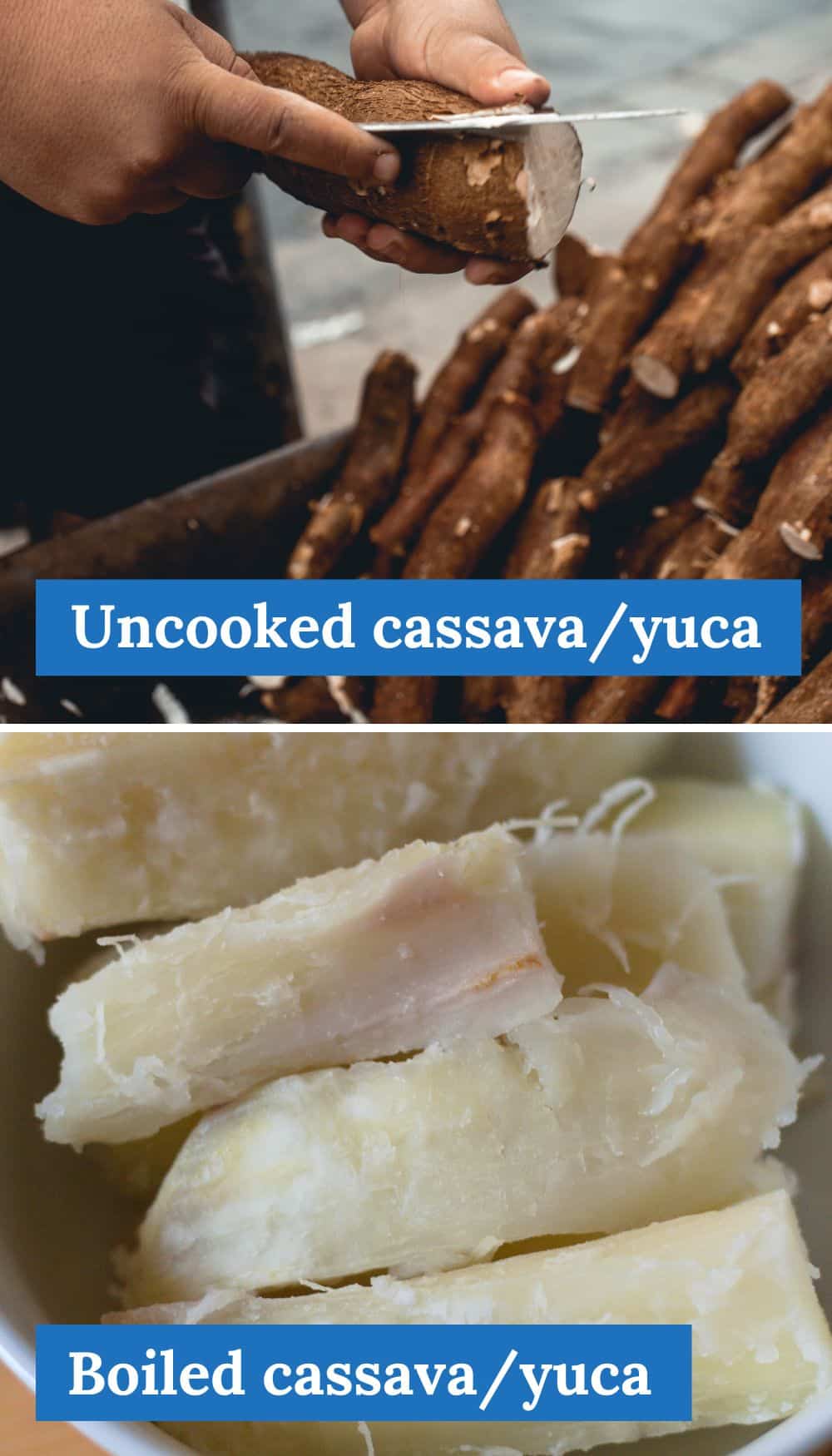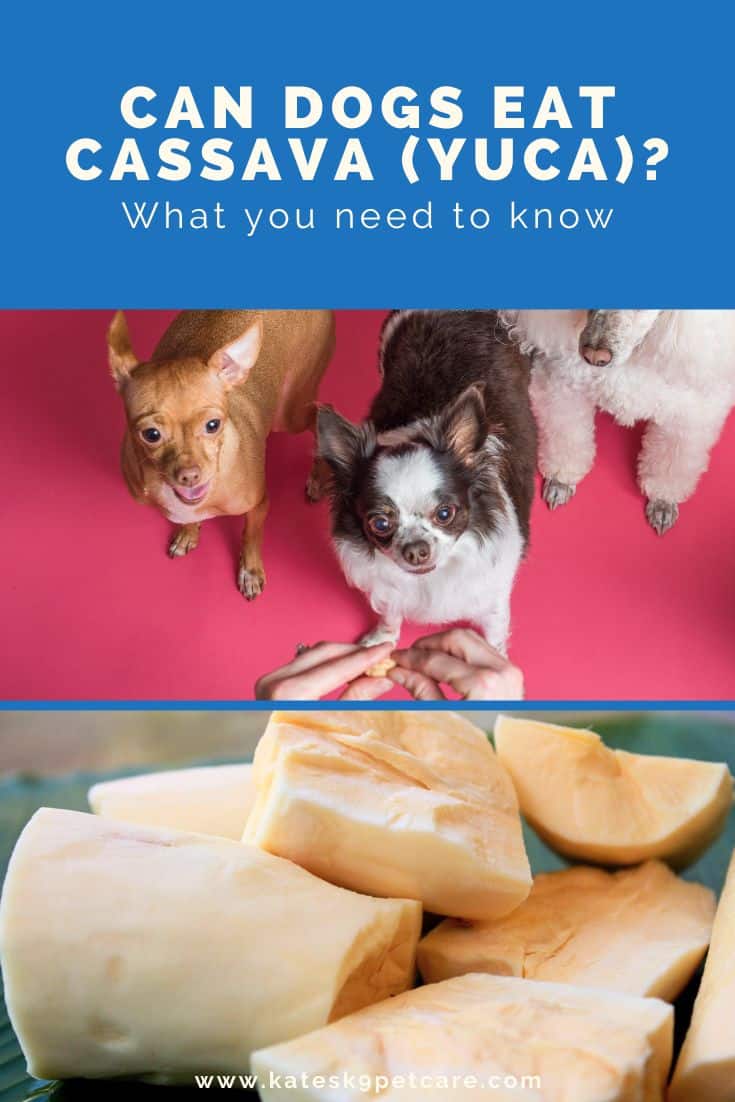Cooking up some cassava (also known as yuca) for dinner and getting puppy eyes from your dog? Not surprising: they want everything we’re having, even if it’s not good for them. It’s up to us to figure out whether they can have a bite or not.
What is cassava?
Let’s get the main issue out of the way first. Even though many folks here in the US have never tried it, this root vegetable (scientifically known as Manihot esculenta) is actually one of the main sources of carbohydrates worldwide. Its popularity has led to it having various different popular names, which can be confusing.
You may see it sold as:
- Cassava (the most common denomination and usually used in English-speaking countries)
- Yuca (usually used in Spanish-speaking countries, not to be confused with an unrelated plant known as “yucca”)
- Manioc (usually used in French-speaking countries)
All are one and the same! Additionally, tapioca starch (the stuff the pearls in your bubble tea are made of) is also derived from cassava. The same goes for farinha (Brazilian cassava flour) and garri (the West African version). A versatile veggie indeed.
As mentioned, cassava is a root vegetable. Originally from Brazil but now also a staple food throughout much of Asia and Africa, it looks like a chunky root with bark-like skin. Once the skin has been peeled away, the inside of the root is whitish in color and has a texture similar to something like a sweet potato.
You can usually find cassava fresh, or at least frozen, in your local Latino, Asian or African supermarket.
Can dogs eat cassava?
The short answer: yes, dogs can eat cassava, but it’s very important to cook it properly.
The long answer: cassava can be a healthy addition to your dog’s diet, and a good way to add some variety. It’s high in fiber and low in fat, and also contains some important vitamins and minerals.
The catch is that cassava is toxic in its raw state. Not just to your dog, but also to you! It contains cyanogenic glycosides, which are converted into dangerous cyanide when the plant is disturbed or damaged. This is common in plants. In fact, bitter almonds also contain cyanogenic glycosides, as do bamboo, apple pits and stone fruit (peach, cherry) pits.
We know the whole “cyanide” thing can sound a bit alarming, but remember that raw potatoes are also toxic, and we all eat those. Boiling, frying, fermenting or baking cassava makes it 100% safe to eat. It’s nutritious, not to mention yummy, and your dog is likely to appreciate being able to try some. Below, let’s have a look at how you can prepare some cassava for your furry friend.
Did you know? Although they’re way less popular than the root, cassava plant leaves are also sometimes consumed. As long as they are cooked to remove the cyanogenic glycosides, they’re safe and healthy for both you and your dog to eat.
How to prepare cassava for your dog
There are literally endless amounts of dishes out there that contain cassava, as this root vegetable is highly versatile. This is great news for us humans, but not so much for your dog. If you want to give it some cassava to try, go for a fresh or frozen root, not a prepared product like fried cassava chips. They’re just too high in salt and fat. The same goes for something like tapioca pearls, which would be fine if they consisted of pure tapioca flour but unfortunately usually contain sugars and flavorings that aren’t great for your dog.
The easiest option is to find pre-cut frozen cassava root, as peeling it yourself can be a bit of a hassle. Just make sure it doesn’t contain added salt. If it’s already boiled, great, you can serve a piece or two to your dog as-is. If it’s not, boil the root in plain water yourself until it can be easily pierced with a fork. This renders it completely safe and easy to eat.
If you usually make your own dog food mixes with rice, veggies, and meats, you can opt to replace the rice with cassava. Variety is the spice of life!
Frequently Asked Questions
Q: Can dogs eat yucca instead of cassava?
A: No, yucca is a different plant and not safe for dogs to eat. Stick to cassava when it comes to feeding your furry friend.
Q: How much cassava can I feed my dog?
A: Cassava should be given as a treat or added to their regular meals in small amounts. It should not exceed more than 10% of your dog’s daily caloric intake.
Q: Are there any risks to feeding my dog cassava?
A: When cooked and served in moderation, cassava is generally safe for dogs. However, if your dog has any underlying health conditions or allergies, it’s best to consult with your veterinarian before introducing cassava into their diet.
Conclusion
So, can dogs eat cassava? Yes, they can, as long as it has been cooked properly. Avoid processed cassava preparations like chips or fried cassava sticks. The best way to prepare this root vegetable for your dog is to just boil it in plain water.
Adding cassava to your dog’s diet can provide them with a healthy and tasty alternative to their regular meals. Just remember to introduce it gradually and in moderation, and always consult with your veterinarian if you have any concerns or questions.
For more information about healthy dog diets and nutrition, visit Pawsoha.

